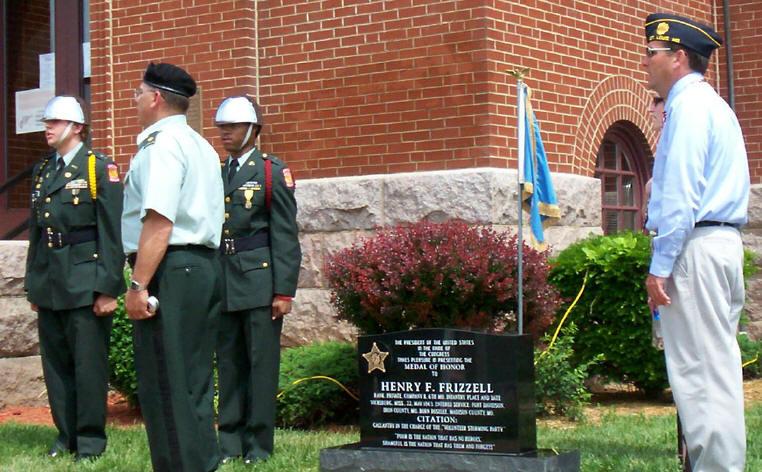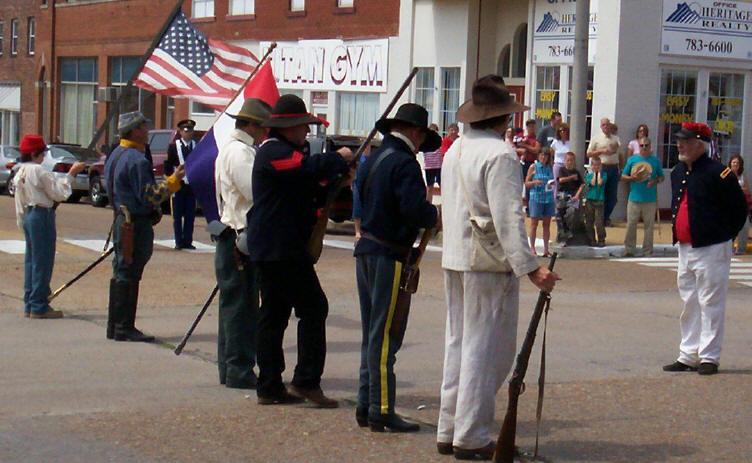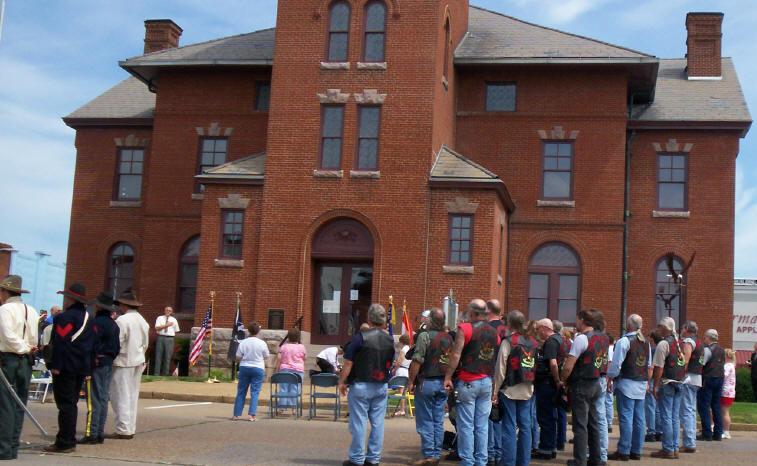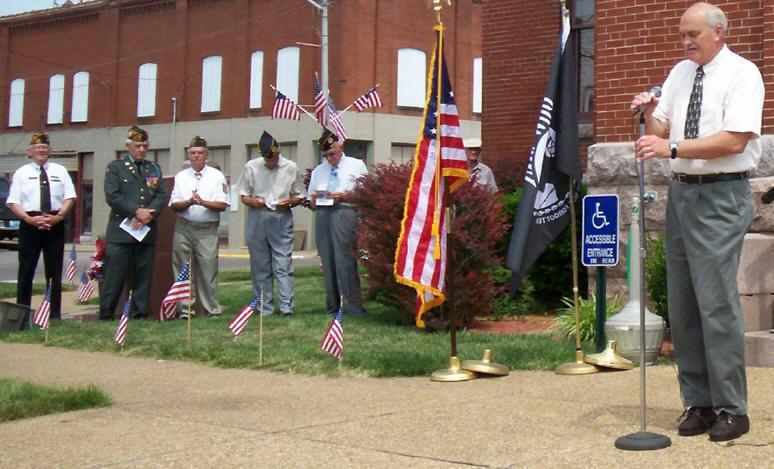|
AN
UNKNOWN HERO TO BE HONORED MONDAY --
MADISON COUNTY PAYS TRIBUTE TO CIVIL WAR MEDAL OF HONOR RECIPIENT -
By SHERRY GREMINGER\Daily Journal Managing Editor
The DAILY JOURNAL, Friday, May 26, 2006
FREDERICKTOWN - For more than 100 years, a hero lay buried in St. Louis
unknown to his family and unknown to his community. Although a stone at
Mount Lebanon Cemetery on St. Charles Rock Road marks his grave site,
noone is really sure the remains of Henry Frizzell are there.
Monday, this man who died a pauper in St. Louis in 1904 will be honored
here as Madison County's only recipient of the Congressional Medal of
Honor.
Finally his family and community will have the opportunity to pay
respects to this Union soldier who labored so hard to get his military
record cleared and to eke out a meager life for himself and his family
in the years following the Civil War.
Frizzell's great-great-grandson Charles Dalton, of St. Louis, and his
two uncles Michael Sutton of St. Louis and David Sutton of Cuba, Mo.
will be in Fredericktown Memorial Day to honor their ancestor. Dalton
said his son might also be there - representing yet another generation
who will finally be able to pay tribute to their family's war hero.
The Medford McClanahan American Legion Post 248 will hold a dedication
ceremony at 11 a.m. Monday on the south lawn of the Madison County
Courthouse to dedicate a monument to Frizzell, as the county's only
Medal of Honor recipient.
Dalton said Frizzell died of consumption May 25, 1904 at City Hospital
and because he was a pauper he was buried in Potter's Field. His remains
have since been moved twice and now supposedly rest in Mount Lebanon
Cemetery on St. Charles Rock Road. When the city sold the ground at
Potter's Field
in 1957, all remains were moved to Mount Lebanon Cemetery.
“When they sent the remains to the cemetery, there were no names or
markers to accompany them. All of the remains were put in one section of
the cemetery. That land was also later sold and the remains were moved
to Section F in the cemetery,” Dalton said.
According to Dalton a marker was dedicated to his ancestor in 1991. The
ceremony was sponsored by the Medal of Honor Historical Society and the
Veterans Administration provided a headstone etched in gold. Dalton said
it was placed at the front of the cemetery because no one was exactly
sure
where his remains might be.
When Frizzell was buried, there is no indication any of his family was
present. One thing, however, is certain - those burying him did not know
Frizzell, the man, or Frizzell, the hero.
HENRY FRIZZELL - THE MAN ---
The attack on Fort Sumter in 1861 coupled with the promise of pay and
food to eat were enough to entice a 21-year-old farmer from
Fredericktown to join the Union Army. Henry Frizzell went to Pilot Knob
on Aug. 6, 1861, and enlisted as a private in Company B, 6th Missouri
Infantry.
Henry was not a tall man, 5 feet, 6 inches. Through letters written for
him, a picture emerges of a fair-haired, gray-eyed man who was born and
raised on the Big St. Francois River. He was born into a poor family and
his parents, Jason and Odeel (Smith) Frizzell could neither read nor
write. Henry reports in letters written for him that there were no
schools for him to attend, so he could not read or write himself.
Henry tells of being wounded several times. He was captured twice by
Confederates and worked for many years following the end of the Civil
War to have desertion charges expunged from his record.
According to historical accounts from the time of Henry's enlistment,
the 6th Missouri Infantry was in the thick of many battles and traveled
from Springfield, Mo. in October of 1861 to Vicksburg, Miss., in 1863
where they joined the assault on the last Confederate stronghold on the
Mississippi River. It was for his actions during this assault that the
Medal of Honor was bestowed upon him.
He was shot in the right side of his head just below his right eye as he
made an assault on Fort Hill. He was captured by the Confederates and
spent one week in their hospital. He was then paroled and sent to the
Jeffersonville, Ohio hospital, where he spent two months.
FORLORN HOPE: VOLUNTEER STORMERS --
Frizzell was a member of a group nicknamed “Forlorn Hope: Volunteer
Stormers.”
A book “Deeds of Valor: How America's Civil War Heroes Won the
Congressional Medal of Honor” published in 1903 recounts in detail the
deeds of the Volunteer Storming Party of Vicksburg.
According to the book, this group, made up entirely of volunteers, led
the general assault on Vicksburg on May 22, 1863. The assault was
thought to be so dangerous that Union Commander Gen. Ulysses S. Grant
would not allow married men to volunteer.
Grant had underestimated the strength of the Confederates and although
he had the city circled on three sides with a 12-mile battle line and
warships stationed on the Mississippi, things were not going well for
the Union general.
Wanting to avoid a lengthy siege, Grant decided to storm the city. The
Confederates had dug in along the top of a bluff and Grant chose a
portion of that bluff which was to the south of Fort Hill. This fort in
addition to being almost perpendicular, was protected by a ditch about
12 feet wide and 5 or 6 feet deep and sloping up toward the enemy's
guns.
It was estimated the storming party needed at least 150 men. Twice that
number answered the call, with those volunteering first being accepted.
The battle plan was formulated. The men were to build a bridge over the
ditch and plant scaling ladders against the embankment. By the time they
had accomplished this feat, it was expected the supporting brigades
would be ready to make the final assault.
THE ASSAULT ---
On the morning of May 22, 1863, the storming party gathered in a ravine
out of sight of the Confederates. Here they had a pile of logs, lumber
and scaling ladders. The advance party's job was for two men to carry
the logs, run toward the trench and throw them across the ditch to form
the
basis of a bridge. The second group was to follow closely with the
lumber to throw across the logs. The third group was to bring the
ladders, run across the bridge and place them against the fort.
From minute one, things did not work out well for the “forlorn hope.”
Enemy fire was so heavy that as they advanced at a dead run, about half
of them were shot down and the area was thick with smoke.
When the survivors did arrive at the ditch, they could not make a bridge
because so many logs and pieces of lumber had been dropped. They also
discovered they could not stay where they were because of heavy enemy
fire.
Historical accounts relate the survivors jumped into the ditch and
Private Howell G. Trogden who carried the storming party's flag planted
it on the parapet of the fort. Trogden kept firing at the enemy when
they tried toreach the flag.
Other brigades advanced to support the small group of men, but only 30
men, those of the 11th Missouri reached them. They planted their flag
and dug in wherever they could find shelter. It was reported the bottom
of the ditch was filled with mangled bodies with heads and limbs blown
off.
The assault had plainly failed, but the men in the ditch could neither
retreat nor advance. They held their position until, under the cover of
darkness, they were able to leave. Of the storming party, 85 percent
were killed and there were only a few who escaped without a wound of
some kind.
In the fighting that followed, the Union suffered more than 3,000
casualties and 97 Union soldiers earned Medals of Honor (the second
largest single-day total in history).
The following Missouri men who survived the siege of Vicksburg were
recognized by their country with the Medal of Honor: John Ayers, 8th
Missouri Infantry; Matthew Bickford, 8th Missouri Infantry; James
Cunningham, 8th Missouri Infantry; James Flynn, 6th Missouri Infantry;
Henry Frizzell (Frazell), 6th Missouri Infantry; Louis Hunt, 6th
Missouri Infantry; David Johnston, 8th Missouri Infantry; George
Stockman, 6th Missouri Infantry; Howell Trogden, 8th Missouri Infantry;
John Wagner, 8th Missouri Infantry; Joseph Wortick, 8th Missouri
Infantry.
DESERTION CHARGES FILED ---
A letter written by a friend in Fredericktown found in his Medal of
Honor file reported Frizzell believed his regiment was in Alabama when
he rejoined it after being released from the hospital following the
siege of Vicksburg. He does report in letters that he fought at the
battle of Chattanooga, Tenn. on Lookout Mountain.
With his regiment now under the command of General William Sherman, he
continued in the March to Atlanta and was shot in the left leg above the
knee at the battle of Resaca Georgia and went to the hospital. He
rejoined his unit and remained with it though Georgia and Carolina until
March of
1864.
On March 1, 1864, at Lynchcreek, North Carolina, Frizzell ended his war
years. He went with a friend to a house to rest and was captured by
enemy forces. He escaped from the Confederates and thinking the war was
over, began his long trek home. This move resulted in desertion charges
being
brought against him.
In letters written for him to help get the charge removed from his
military record, he tells of being tired, confused and captured.
In a letter written Feb. 18, 1891, Frizzell tells how Andy Harness, who
was in the same regiment with him persuaded him to go to a private home
where they could get some rest. He said Harness convinced him that the
“Rebels were whipped and the war would soon be over.”
While they were resting at the home, they were captured by Confederates.
They did escape, but their regiment had moved north and with
Confederates everywhere, Frizzell is quoted as saying, “It was
impossible to rejoin the unit.”
It is reported that everywhere they went they kept hearing that the war
was over, so he just started working his way back to Madison County.
Another letter states, “My head hurt and my left leg, which had been
wounded, gave out.”
The author of the letter wrote that Frizzell said he only went to the
home with Harness because he was not well and was completely worn out.
The writer said Frizzell told him that since being wounded at Vicksburg,
his memory had been bad and he “cannot recall important things to family
and myself. I am satisfied that at times I am not in my right mind. I
was laboring under this state of mind when I left my command.”
Several more letters, most written in February of 1891, attested to
Frizzell's good character, but alluded to mental problems probably
caused by his injures suffered at Vicksburg.
One letter written by Jonathan Williams said, “After the war he has been
of weak mind, almost like an idiot and hardly of a mind to care for
himself. He is very poor and destitute and the only support is from what
little labor he can do.”
Yet another letter, written by Fielding King who enlisted in the 6th
Regiment with Frizzell said, “Henry was shot on the side of the head
cutting his ear and corner of the right eye at Vicksburg. When he
rejoined the regiment, he never appeared to be entirely himself. He
never would have left, with Andrew Harness, on his own accord. He was a
good soldier, he never shirked his duty nor tried to keep out of battle.
He returned to Madison County in September of 1865.”
Thomas Hollday (sic) stated that he had know Frizzell since childhood
and aided him as he could. He said he paid for all the cost for postage
and affidavits because “he is very poor, illiterate and ignorant. His
mind is weak and memory bad but he is a good citizen.”
AN HONORED VETERAN ---
All these letters must have helped because in a letter dated March
31,1891, the War Department removed the charge of desertion from his
record.
The last letter in Frizzell's Medal of Honor file is one dated June
30,1894 which says that he had been awarded a Medal of Honor medal which
would be forwarded by mail.
This letter stated, “I have the honor to inform you that... By direction
of the President, and without solicitation from any source - the award
being based solely upon the official records - let a Medal of Honor be
presented to Private Henry F. Frizzell, Co. B, 6th Missouri Infantry,
for most distinguished gallantry in action at Vicksburg, Miss., May 22,
1863.
“The soldier was a member of a volunteer storming party which made a
most gallant assault upon the enemy's works. Signed: Joseph B. Doe,
Asst. Secretary of War.”
None of his living descendants know what happened to that medal, nor how
Frizzell ended his life destitute in St. Louis.
But on Memorial Day, none of that will matter. A hero will be honored
and members of his family and community will be witness to the ceremony.
The DAILY JOURNAL, Friday, May 26, 2006
|
![]()
![]()
![]()
![]()
![]()




![]()